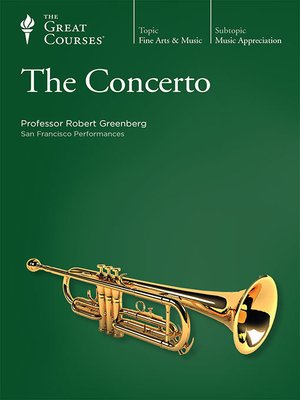
Sign up to save your library
With an OverDrive account, you can save your favorite libraries for at-a-glance information about availability. Find out more about OverDrive accounts.
Find this title in Libby, the library reading app by OverDrive.



Search for a digital library with this title
Title found at these libraries:
| Library Name | Distance |
|---|---|
| Loading... |
The concerto offers a kind of unique excitement no other instrumental music can match. Where a symphony enthralls us with its thematic variations and development, a concerto gives us human drama - the exhilaration of a soloist or group of soloists ringing forth against the mass of the orchestra. In 24 musically rich lectures, Professor Greenberg provides a guided tour of the concerto, from its conception as a child of Renaissance ideals, through its maturation in the Classical age, its metamorphosis in the Romantic era, and its radical transformation in the 20th century and beyond. You'll listen to selections from nearly 100 concerti from more than 60 composers - from Gabrieli to Gershwin, from Schumann to Shostakovich. Along with the bedrock of the repertoire - represented by Vivaldi, Bach, Mozart, Beethoven, Mendelssohn, Chopin, Schumann, Liszt, Brahms, Tchaikovsky, Dvorak, Rachmaninoff, Bartok, and many others - you are introduced to superb concerti by a host of less-familiar masters. You'll study in depth some of the greatest and most beloved works of the genre, including Mozart's Concerto for Flute in G Major, K. 313; Haydn's Concerto for Trumpet in E-flat Major; Beethoven's Piano Concerto no. 4 in G Major, op. 58; Chopin's Piano Concerto no. 2 in F Minor, op. 21; Grieg's Piano Concerto in A Minor, op. 16; and Tchaikovsky's Violin Concerto in D Major, op. 35. Finally, you'll look at some notoriously esoteric and difficult 20th-century composers, including Arnold Schönberg and Elliott Carter, learning how their music is much more accessible than it appears.







